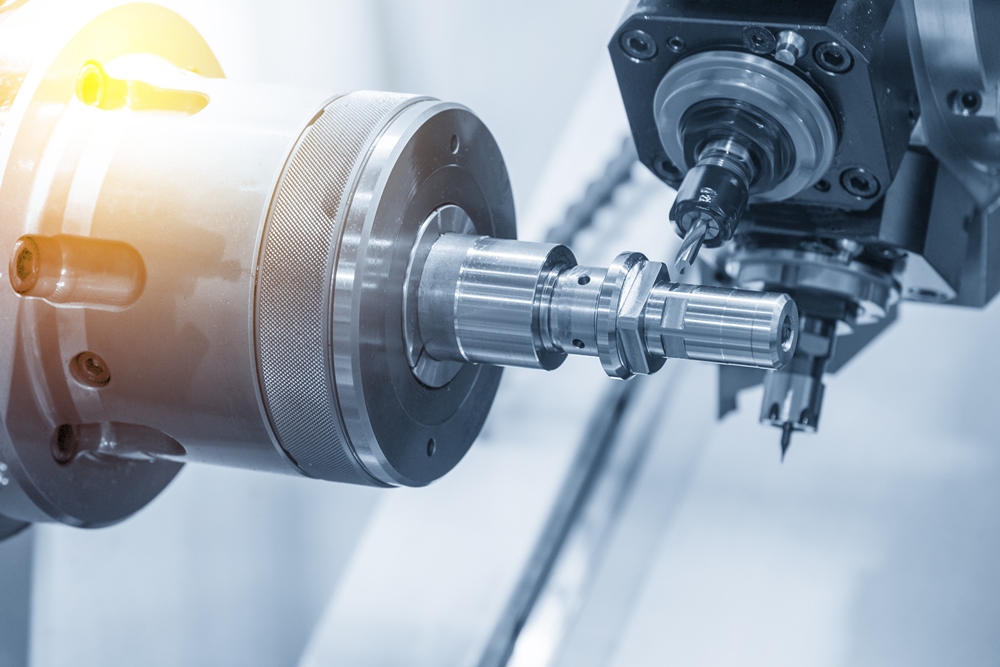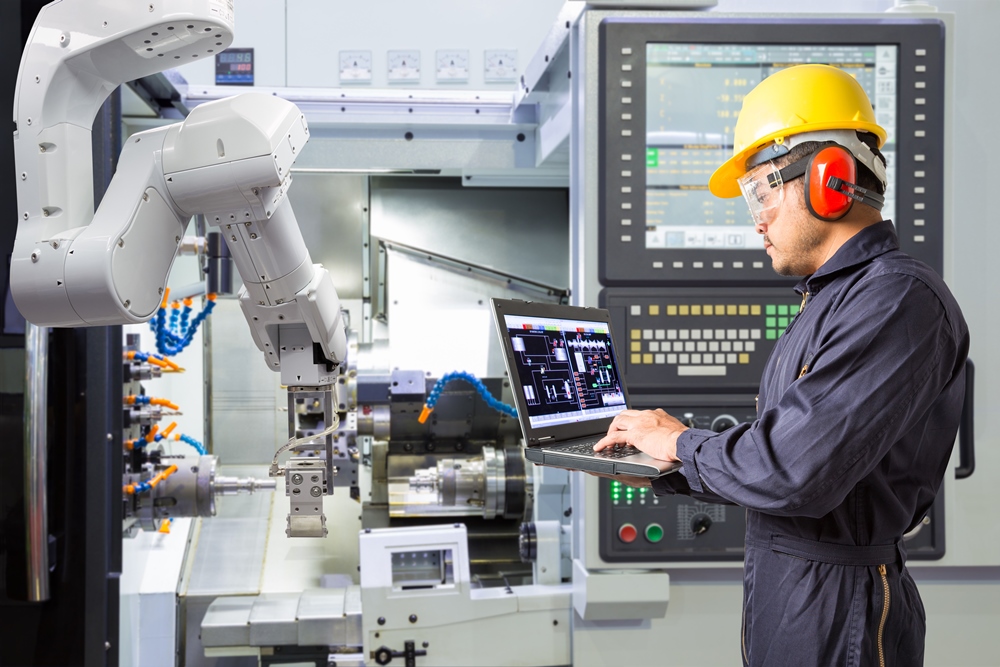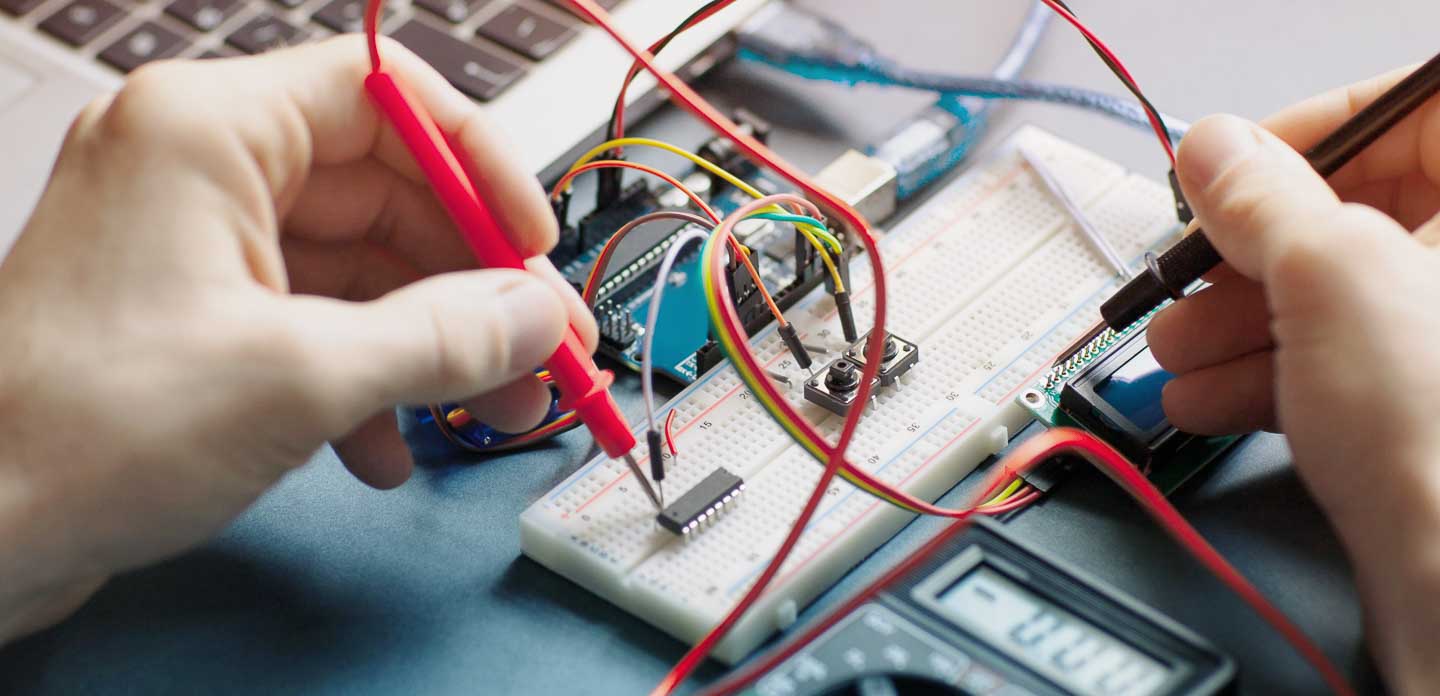GIU Faculty of Engineering
"Dedication to Precision, Function and Power"
NOW in Egypt
German International University (GIU) offers industry-focused and future-oriented Bachelors, Masters and PhD Degrees in the following specializations and majors of the Faculty of Engineering.
 English is the Teaching Language
English is the Teaching Language
Faculty Dean:

Prof. Dr.-Ing. Ansgar Meroth –
Dean of the Faculty of Engineering
Study Duration: 8 Semesters (4 years) + 1.5 years (Master's)
Degrees awarded: Bachelors, Masters of Science Degree
Majors Offered:
- Automotive Mechatronics
- Manufacturing Engineering
- Robotics and Automation
- Automation and Control Engineering
- Electrical Power Systems Engineering
Why GIU Faculty of Engineering?
Germany’s prowess in engineering is indisputable. Engineers borne out of the country are world leaders in their field, renowned for their dedication to precision, function and power. Over the years, it has maintained its reputation as a top exporter of innovation, technology, machinery and industrial equipment.
Now in Egypt and taught in English, the GIU Faculty of Engineering is transferring German engineering excellence in university education to Egypt, Africa and the region. We implement the most innovative and employability university-orientated study programs & teaching approaches of German Systems to our valued students to guarantee German exceptional standards and outcome.
Privileges & Competitive Edge
- Close cooperation with industry (e.g. Curricula, Internships, Thesis writing)
- Practice-oriented teaching
- Emphasis on self-directed team work and analytical thinking
- Think critically and act responsibly (e.g. business ethics and sustainability issues)
- Academics with profound industrial experience
- Prepare students for professional activities while taking into account ongoing developments in industry and the international environment.
Job Profiles
- Global multi-tasking engineering professionals in the most “in-demand”, highest paid engineering fields both locally and internationally in the fields of automotive mechatronics, manufacturing engineering, robotics, automation and electrical power systems
- Capable Project Engineers leading teams in multicultural environments
- Goal-oriented Engineers providing professional expertise towards the integration of more universally sustainable approaches and expertise using scarce resources to meet current and future energy needs
- Innovative Electrical Engineers experimenting with new techniques and new technologies
- Detail-oriented, accomplished managers with a bottom-up approach piecing together systems to give rise to more value-adding complex ones with higher speed and precision
- Robotic Engineers who utilize big data science, machine learning and cloud computing to increase productivity and efficiency
- Manufacturers and Industrialists leading multinational corporations
- Insightful engineering consultants with encompassing knowledge
Major Descriptions, Courses Overview & Job Profiles
Automotive Mechatronics Program
If you want to develop, build, and be part of tomorrow's vehicles, you should decide on this degree program!

(Source: Heilbronn University of Applied Sciences)
Automotive Mechatronics study program aims at establishing the foundation required in these fields of science upon which modern vehicles are developed. Through the integration of multi-discipline technologies, the different subsystems of the vehicle are designed, fabricated, tested and improved to meet their task requirements.
The program offers the required mechanical background to consider during the design process of the vehicles. The electronic and electrical components are studied as they are the actuators and sensors of the vehicle. The brain of the vehicle is introduced through the utilization of the different programming languages and algorithms. On top of that, control theory is implemented in order to guarantee that the vehicle executes the desired tasks.
The Automotive Mechatronics study program opens the door for you towards the future of one of the most widely growing fields of vehicles. It doesn’t only present to you the know-how of the science, but it also provides hands-on experience of how things function and operate in real life. If you are a vehicles’ enthusiast or want to be part of the driverless future vehicle join this study program.
First Semester
| Course Name | ECTS |
| Mathematics I | 8 |
| Computer Science I | 6 |
Physics | 5 |
| Chemistry | 6 |
| Production Technology | 2 |
| English for Academic Purposes and Study Skills | 2 |
| German I | 2 |
Second Semester
| Course | ECTS |
| Mathematics II | 8 |
| Computer science II | 6 |
| Physics Lab | 2 |
| Technical Drawing | 3 |
| Electrical Engineering I | 6 |
| Critical Thinking & Scientific Methods | 2 |
| German II | 2 |
Third Semster
| Course | ECTS |
| Software Engineering | 5 |
| Sensors and Metrology | 4 |
| Electrical Engineering and Electronics | 5 |
| Mechanics I | 5 |
| Machining processes | 2 |
| Materials, Metals and Plastics | 2 |
| Materials Lab | 2 |
| Communication & Presentation Skills | 2 |
| German III | 2 |
Fourth Semester
| Course | ECTS |
| Modelling and Simulation of Dynamic Systems | 5 |
| Signals and Systems | 5 |
| Microcontrollers | 4 |
| Mechanics II | 3 |
| Engineering Design I | 5 |
| Mechanics of Materials | 4 |
| Research Paper Writing | 2 |
| German IV | 2 |
Fifth Semester
| Course | ECTS |
| Control Systems for Mechatronics Engineers | 5 |
| Engineering Physics and Metrology | 4 |
| CAD | 4 |
| Machine Elements | 3 |
| Automotive Basics | 5 |
| Elective 1 | 5 |
| Elective 2 | 5 |
Sixth Semester
| Course | ECTS |
| Project Management | 2 |
| Vehicle Dynamics | 5 |
| Vehicle Powertrain | 5 |
| Elective 3 | 5 |
| Elective 4 | 5 |
| Elective 5 | 4 |
| Elective 6 | 4 |
Seventh Semster
| Course | ECTS |
| Bachelor Thesis and Colloquium | 20 |
| Research Methodology | 5 |
| Workplace and Internship Readiness | 5 |
Eighth Semester
| Course | ECTS |
| Internship | 20 |
| Internship-Accompanying Seminar | 5 |
| Business Ethics | 5 |
ECTS: The European Credit Transfer and Accumulation System
*Changes may occur to this curriculum without prior notice.
Manufacturing Engineering Program

The Bachelor of Science degree program in Manufacturing Engineering is designed to provide students with a foundation of knowledge and hands-on experience that is required and utilized by the industry in the field of manufacturing. The program offers traditional courses such as Mathematics, Physics, Statics, Strength of Materials, Manufacturing Processes, and Material Science providing graduates with a solid foundation of the field. The program also offers numerous technology-based and practical courses such as Computer Aided Design (CAD), Computer Aided Manufacturing (CAM), Computer Numeric Control (CNC) Machining, and Tooling for Composites, Electronics Applications, Electromechanical Control Systems, Robotics, and Statistical Quality Control providing students with a well-balanced and needed background to support different aspects of manufacturing.
The study program Manufacturing Engineering will give the graduates the chance and prepare them to enter careers in manufacturing process and systems design, operations, quality, continuous improvement, lean manufacturing, and sustainability in different industries from the food industry to the automotive and aerospace industries.
Manufacturing Engineering students will be introduced to the following:
- In-depth basic engineering education focusing on manufacturing.
- Designing and optimizing mechanical components, systems and processes.
- Qualification for interdisciplinary project work and communication in an international context.
- Achieve high efficiency through the implementation of advanced engineering tools in CAD, CAM, modeling and simulation.
- Knowhow on processing various materials like metals, plastics, composites and ceramics.
Manufacturing Engineering Program Outcomes:
Graduates will have the knowledge and skills to enter careers in different aspects of manufacturing.
Graduates will have the ability to provide solutions and solve manufacturing engineering technology related problems.
Graduates will have the technical background to advance in their careers with an understanding and necessity for personal integrity, ethical behavior, cultural awareness, lifelong learning, and continuous improvement.
First Semester
| Course Name | ECTS |
| Mathematics I | 8 |
| Computer Science I | 6 |
Physics | 5 |
| Chemistry | 6 |
| Production Technology | 2 |
| English for Academic Purposes and Study Skills | 2 |
| German I | 2 |
Second Semester
| Course | ECTS |
| Mathematics II | 8 |
| Computer science II | 6 |
| Physics Lab | 2 |
| Technical Drawing | 3 |
| Electrical Engineering I | 6 |
| Critical Thinking & Scientific Methods | 2 |
| German II | 2 |
Third Semster
| Course | ECTS |
| Software Engineering | 5 |
| Sensors and Metrology | 4 |
| Electrical Engineering and Electronics | 5 |
| Mechanics I | 5 |
| Machining processes | 2 |
| Materials, Metals and Plastics | 2 |
| Materials Lab | 2 |
| Communication & Presentation Skills | 2 |
| German III | 2 |
Fourth Semester
| Course | ECTS |
| Modelling and Simulation of Dynamic Systems | 5 |
| Signals and Systems | 5 |
| Microcontrollers | 4 |
| Mechanics II | 3 |
| Engineering Design I | 5 |
| Mechanics of Materials | 4 |
| Research Paper Writing | 2 |
| German IV | 2 |
Fifth Semester
| Course | ECTS |
| Control Systems for mechatronics Engineers | 5 |
| Engineering Physics and Metrology | 4 |
| CAD | 4 |
| Machine Elements | 3 |
| Manufacturing | 5 |
| Elective 1 | 5 |
| Elective 2 | 5 |
Sixth Semester
| Course | ECTS |
| Project Management | 2 |
| Facility Design | 5 |
| Quality Control | 5 |
| Elective 3 | 5 |
| Elective 4 | 5 |
| Elective 5 | 4 |
| Elective 6 | 4 |
Seventh Semster
| Course | ECTS |
| Bachelor Thesis and Colloquium | 20 |
| Research Methodology | 5 |
| Workplace and Internship Readiness | 5 |
Eighth Semester
| Course | ECTS |
| Internship | 20 |
| Internship-Accompanying Seminar | 5 |
| Business Ethics | 5 |
ECTS: The European Credit Transfer and Accumulation System
*Changes may occur to this curriculum without prior notice.
Robotics and Automation Engineering Program

(Source: Heilbronn University of Applied Sciences)
Robotics and Automation – the technology of the future! Engineers in that field solve the problems of today and develops the products of tomorrow. This field forms the bridge between Mechanical Engineering, Electrical Engineering and Computer Science. That's why our students learn methodically and across disciplines to solve technical problems.
The Program qualifies students to describe, model and simulate complex technical systems with Mathematical and Technical foundations of Mechanics, Electrical Engineering and Computer Science and thus enable them to make a significant contribution to the development of Mechatronic Systems consisting of sensors, actuators, information processing and the mechanical structure including communication technology and human machine interface with a special focus is on robotics and automation and its applications.
With a degree in Robotics and Automation, you are well prepared for current and future development tasks in the national, regional and globally active industry.
First Semester
| Course Name | ECTS |
| Mathematics I | 8 |
| Computer Science I | 6 |
Physics | 5 |
| Chemistry | 6 |
| Production Technology | 2 |
| English for Academic Purposes and Study Skills | 2 |
| German I | 2 |
Second Semester
| Course | ECTS |
| Mathematics II | 8 |
| Computer science II | 6 |
| Physics Lab | 2 |
| Technical Drawing | 3 |
| Electrical Engineering I | 6 |
| Critical Thinking & Scientific Methods | 2 |
| German II | 2 |
Third Semster
| Course | ECTS |
| Software Engineering | 5 |
| Sensors and Metrology | 4 |
| Electrical Engineering and Electronics | 5 |
| Mechanics I | 5 |
| Machining processes | 2 |
| Materials, Metals and Plastics | 2 |
| Materials Lab | 2 |
| Communication & Presentation Skills | 2 |
| German III | 2 |
Fourth Semester
| Course | ECTS |
| Modelling and Simulation of Dynamic Systems | 5 |
| Signals and Systems | 5 |
| Microcontrollers | 4 |
| Mechanics II | 3 |
| Engineering Design I | 5 |
| Mechanics of Materials | 4 |
| Research Paper Writing | 2 |
| German IV | 2 |
Fifth Semester
| Course | ECTS |
| Control Systems for Mechatronics Engineers | 5 |
| Engineering Physics and Metrology | 4 |
| CAD | 4 |
| Machine Elements | 3 |
| Robotics | 5 |
| Elective 1 | 5 |
| Elective 2 | 5 |
Sixth Semester
| Course | ECTS |
| Project Management | 2 |
| Industrial Robots | 5 |
| Parallel Kinematics & Kinetics | 5 |
| Elective 3 | 5 |
| Elective 4 | 5 |
| Elective 5 | 4 |
| Elective 6 | 4 |
Seventh Semster
| Course | ECTS |
| Bachelor Thesis and Colloquium | 20 |
| Research Methodology | 5 |
| Workplace and Internship Readiness | 5 |
Eighth Semester
| Course | ECTS |
| Internship | 20 |
| Internship-Accompanying Seminar | 5 |
| Business Ethics | 5 |
ECTS: The European Credit Transfer and Accumulation System
*Changes may occur to this curriculum without prior notice.
Automation and Control Engineering

The Bachelor's program in Electrical Engineering (EE) offers scientific methods and skills for solving problems in practical settings. The EE program leads to a Bachelor of Engineering (B.Eng.) degree. Important objectives of the study program are the teaching of methodological and social competence in small seminar groups. In addition to the seminars, the students com-plete a large proportion of practical laboratory exercises and carry out projects that are inten-sively supervised by professors and teaching assistants.
The Bachelor's program in Electrical Engineering prepares students for engineering activities in (1) the development of devices and systems in electrical energy and automation technology, (2) project planning of electrical and automation systems and (3) their operation, testing and maintenance. The technical and methodological skills are developed for the following cutting-edge areas of electrical engineering:
Automation Engineering and Control of Cyber-physical Systems (CPSs)
• Mathematical modeling and simulation of automated systems and CPSs, in particular for control engineering
• Development of hardware and software components for process automation
• Programming of microcomputers and programmable logic controllers for production systems and mobile applications
• Development and project engineering of distributed automation systems and their con-trol via digital networks.
First Semester
| Course Name | ECTS |
| Mathematics I | 8 |
| Computer Science I | 6 |
Physics | 5 |
| Chemistry | 6 |
| Production Technology | 2 |
| English for Academic Purposes and Study Skills | 2 |
| German I | 2 |
Second Semester
| Course | ECTS |
| Mathematics II | 8 |
| Computer science II | 6 |
| Physics Lab | 2 |
| Technical Drawing | 3 |
| Electrical Engineering I | 6 |
| Critical Thinking & Scientific Methods | 2 |
| German II | 2 |
Third Semester
| Course | ECTS |
| Sensors and Metrology | 4 |
| Electrical Engineering II | 5 |
| Electronics I | 4 |
| Signals and Systems | 5 |
| Microcontrollers | 4 |
| Electrical and Electronics Lab | 4 |
| Communication & Presentation Skills | 2 |
| German Language III | 2 |
Fourth Semester
| Course | ECTS |
| Modeling and Simulation of Dynamic Systems | 5 |
| Electric Machines and Drives | 6 |
| Electronics II | 6 |
| Classic Control Engineering | 5 |
| Control Systems Lab | 4 |
| Research Paper Writing | 2 |
| German Language IV | 2 |
Fifth Semester
| Course | ECTS |
| Power Electronics I | 5 |
| Modeling and Control of Renewable Energy Systems | 5 |
| Advanced Control Systems | 5 |
| Embedded Systems | 5 |
| Elective 1 | 5 |
| Elective 2 | 5 |
Sixth Semester
| Course | ECTS |
| Project Management | 2 |
| Computer-Controlled Systems | 5 |
| Industrial Automation & PLC Programming | 5 |
| Elective 3 | 5 |
| Elective 4 | 5 |
| Elective 5 | 4 |
| Elective 6 | 4 |
Seventh Semster
| Course | ECTS |
| Bachelor Thesis and Colloquium | 20 |
| Research Methodology | 5 |
| Workplace and Internship Readiness | 5 |
Eighth Semester
| Course | ECTS |
| Internship | 20 |
| Internship-Accompanying Seminar | 5 |
| Business Ethics | 5 |
ECTS: The European Credit Transfer and Accumulation System
*Changes may occur to this curriculum without prior notice.
Electrical Power Systems Engineering Program

The Bachelor's program in Electrical Engineering (EE) offers scientific methods and skills for solving problems in practical settings. The EE program leads to a Bachelor of Engineering (B.Eng.) degree. Important objectives of the study program are the teaching of methodological and social competence in small seminar groups. In addition to the seminars, the students com-plete a large proportion of practical laboratory exercises and carry out projects that are inten-sively supervised by professors and teaching assistants.
The Bachelor's program in Electrical Engineering prepares students for engineering activities in (1) the development of devices and systems in electrical energy and automation technology, (2) project planning of electrical and automation systems and (3) their operation, testing and maintenance. The technical and methodological skills are developed for the following cutting-edge areas of electrical engineering:
Electrical Power Engineering and Sustainable Systems
• Mathematical modeling and control of sustainable power systems
• Power electronics and electric drives
• Automation of power systems and smart grids
• Project engineering, construction and maintenance of components and
plants for electrical energy technology
• Project management in power plant engineering
First Semester
| Course Name | ECTS |
| Mathematics I | 8 |
| Computer Science I | 6 |
Physics | 5 |
| Chemistry | 6 |
| Production Technology | 2 |
| English for Academic Purposes and Study Skills | 2 |
| German I | 2 |
Second Semester
| Course | ECTS |
| Mathematics II | 8 |
| Computer science II | 6 |
| Physics Lab | 2 |
| Technical Drawing | 3 |
| Electrical Engineering I | 6 |
| Critical Thinking & Scientific Methods | 2 |
| German II | 2 |
Third Semester
| Course | ECTS |
| Sensors and Metrology | 4 |
| Electrical Engineering II | 5 |
| Electronics I | 4 |
| Signals and Systems | 5 |
| Microcontrollers | 4 |
| Electrical and Electronics Lab | 4 |
| Communication & Presentation Skills | 2 |
| German Language III | 2 |
Fourth Semester
| Course | ECTS |
| Modeling and Simulation of Dynamic Systems | 5 |
| Electric Machines and Drives | 6 |
| Electronics II | 6 |
| Classic Control Engineering | 5 |
| Control Systems Lab | 4 |
| Research Paper Writing | 2 |
| German Language IV | 2 |
Fifth Semester
| Course | ECTS |
| Power Electronics I | 5 |
| Modelling and Control of Renewable Energy Systems | 5 |
| Electric Power Systems I | 5 |
| Design of Electrical Facilities | 5 |
| Elective 1 | 5 |
| Elective 2 | 5 |
Sixth Semester
| Course | ECTS |
| Project Management | 2 |
| Power Electronics II | 5 |
| Electric Power Systems II | 5 |
| Elective 3 | 5 |
| Elective 4 | 5 |
| Elective 5 | 4 |
| Elective 6 | 4 |
Seventh Semster
| Course | ECTS |
| Bachelor Thesis and Colloquium | 20 |
| Research Methodology | 5 |
| Workplace and Internship Readiness | 5 |
Eighth Semester
| Course | ECTS |
| Internship | 20 |
| Internship-Accompanying Seminar | 5 |
| Business Ethics | 5 |
ECTS: The European Credit Transfer and Accumulation System
*Changes may occur to this curriculum without prior notice.